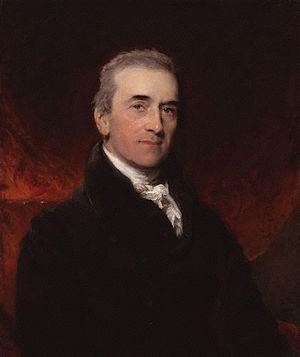Robert Morris
Robert Morris | |
|---|---|
 Portrait by Arthur Corrigan, 1832 | |
| 1st President of Audonia | |
| In office September 9, 1817 – July 15th, 1826 | |
| Preceded by | Office established |
| Succeeded by | Henry Burdett |
| Personal details | |
| Born | 27 March 1781 Elland's Isle, Arabelline |
| Died | 11 July 1841 (aged 60) Sunrise House, Euston, Audonia |
| Resting place | Morriston Cathedral, Morriston |
| Height | 5 ft 10 in (178 cm) |
| Spouse | Charlotte Anne Blaylock |
| Military service | |
| Allegiance | |
| Branch/service | Royston's Militia Free Audonian Army Republican Army |
| Years of service | 1801-1805 (Rosyton's Militia) 1804-1817 (Free Audonia Army) 1817-1851 (Republican Army) |
| Rank | Major (Royston's Milita) General (Free Audonian Army) Commander-in-Chief (Republican Army) Lieutenant General (Republican Army) |
| Battles/wars | Third Ausser War Amandine War of Independence Audonian War of Independence First Continental War |
Robert Morris (March 27 1781 - 11 July 1841) was an Audonian statesman, military commander, founding father, and businessman who served as the first President of Audonia from 1817 to 1826. Prior to that, he had led Audonia to independence over a period of 13 years. He oversaw both the Audonian Senatorial Founding and the reconstruction of the federal government, turning it from a purposefully weak government into a centralised and strong government. He has often been referred to as the Father of the Nation due to his efforts in organising the nation both prior and post independence.
Born into a wealthy family on Elland's Island, he first became influenced by the growing Audonian independence movement at the university of Holywell, before purchasing his commission at the outbreak of the Third Ausser War. While serving, he became affiliated with the independence movement and, due to his military experience, travelled to Amandine to participate in its war of independence. Upon his return to Holywell, Morris was installed in as commander-in-chief for the Brother's in Freedom movement and oversaw a series of attacks on military depots and the opening stages of the Audonian War of Independence. By 1814, Morris had reorganised the movement into the Free Audonian Army and won a number of costly victories. By the end of the war in 1817, Morris had become the most well-known figure in Audonia.
Despite intending to retire from public life, he instead used his influence to oversee the pass of the Reconstruction Bill following the failure of the Senatorial Founding. In recognition, the Senate elected him president of Audonia. His two terms saw a number of radical events, such as the purchase of Marbon Island from Blayk, attempts at forming relations with a number of Auressian nations, as well as the debate of slavery in Audonia. Additionally, the worsening of relations between Audonia and Amandine risked conflict that could ruin the new state. By 1826, Morris declined a third term, instead returning to Elland's Island to oversee its running following the death of his brother. However, the loss of Marbon Island to the Confederation of Southern Marceaunia in 1830 saw him return as a private citizen to the reserve ranks of the Republican Army of Audonia, with which he later participated in the recapture of the island and the organising of supply shipments to the rebelling nations during the First Continental War. Following this, he retired for the final time, returning again to Elland's Island and becoming an moderately successful writer.
Despite Morris being regarded as a defender of both republicanism and anti-colonialism, his legacy remains controversial over his decision to maintain slavery as an institution. Despite the presence of slaves on his lands, he eventually began to take a dislike to it and freed them in 1832, however he did not advocate for its abolition due to his dislike of using his influence and not wishing to be seen as returning to government despite his retirement. Despite this, Morris is recognised as a leading figure in Audonian history, in addition to his restructured government being the basis of a number of likewise newly independent nations. He's memorialised throughout Audonia, most notably through the capital being renamed Morriston after his death. He is frequently rated among the greatest Audonians.